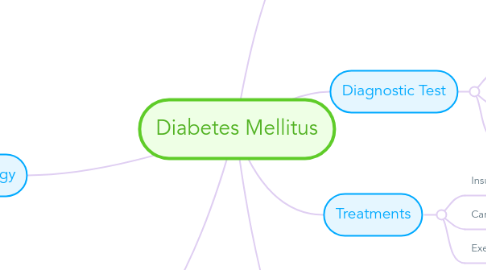
1. Pathophysiology
1.1. Blindness
1.2. Heart Disease
1.3. Kidney Failure
1.4. Elevated Blood Glucose
1.5. Insulin Resistance
2. Chromosome 11
2.1. Mutations on CTLA 4 ; cytotoxic lymphosyte
2.2. PTPN22; lymphoid tyrosine phosphate
2.2.1. negatively regulates T-cell activation, also linked to Lupus, Arthritis, Thyroid disease
3. Type 2
3.1. Autosomal Dominate
3.2. Obesity
3.2.1. Insulin Resistance
3.2.1.1. MODY: mature onset diabetes of youth
3.2.1.1.1. Cause:Mutations of Glucokinase genes and 5 other genes that regulate insulin in the pancreas
3.3. Gene mutations
3.3.1. KCNJ11; Potassium channel glucose secretion pathology
3.3.2. TCF 12; endcodes for secretion of insulin
3.3.3. PPAR-y; adpocyte differentiation & glucose metabolization
4. Diagnostic Test
4.1. HemeA1c
4.2. Blood Glucose Monitoring
4.3. Genetic marker testing
5. Treatments
5.1. Insulin
5.2. Carbohydrate limitation
5.3. Exercise: increases insulin sensitivity
6. Type 1 insulin dep
6.1. Pathophyology
6.1.1. T-cells infiltrate pancreas kill insulin producing B cells
6.1.2. Autoantibiodies are formed against pancreatic cells
6.2. Genetic Risk factors
6.2.1. HLA 2 Allels gene mutation; HLA DR3,4, inappropriate autoimmune activation
6.2.1.1. Aspartic acid on position 57 mutates and changes shape of the molecule, decreasing its ability to bind to T-cells
6.3. Causitive Factors
6.3.1. Genetic factors not exclusively responsible for disorder, viral infections activate autoimmune response
